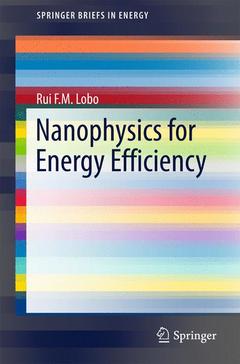Description
Nanophysics for Energy Efficiency, 1st ed. 2015
SpringerBriefs in Energy Series
Author: Lobo Rui F. M.
Language: English
Subject for Nanophysics for Energy Efficiency:
Keywords
Application of Nanotech for Energy Efficiency; Electrical Energy Storage; Electrochemical Energy Storage Devices; Electrochemistry Technique for Energy Harvesting; Energy Efficiency in Nanotechnology; Energy Harvesting Systems; Nanoelectromechanical Systems; Nanofabrication and Nanotribology; Scanning Probe Microscopy; Scanning Probe Techniques in Energy Harvesting
73 p. · 15.5x23.5 cm · Paperback
Description
/li>Contents
/li>Biography
/li>Comment
/li>
Links the hot topics of nanotechnology and energy
Explains the relevance of nanotechnology to various energy challenges
Offers a concise summary of the state of the art in the field
Includes supplementary material: sn.pub/extras

